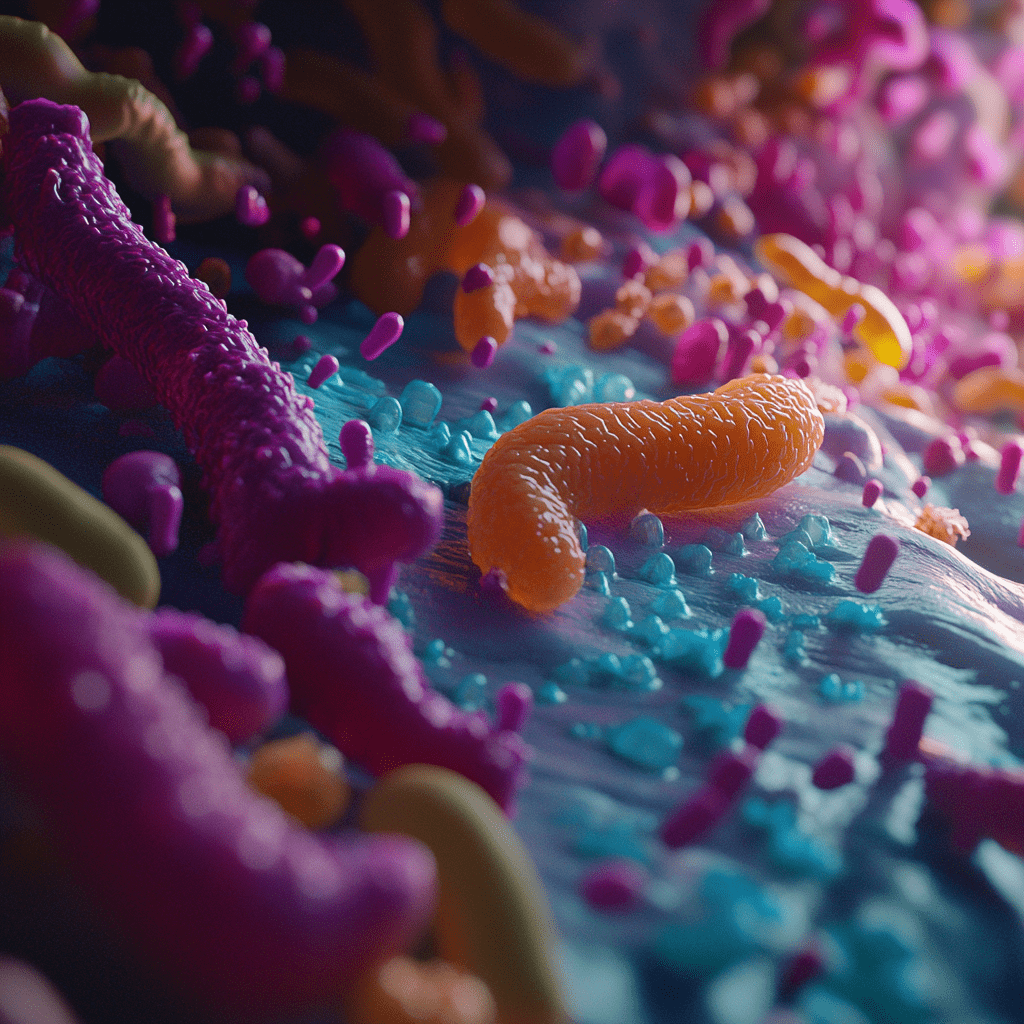
Can Fasting Improve Your Gut Health?


Can Fasting Improve Your Gut Health?
Fasting gets a lot of attention not only as a weight-loss strategy but also for its potential benefits on overall health and longevity. Among the many areas of health impacted by fasting, gut health stands out as a particularly promising one. Aside from digestion, your gut and the microbes that live inside it are central to all aspects of your health, from mental health to skin.
But how exactly does fasting influence our gut health? In this article, we’ll explore the latest evidence.
What is Intermittent Fasting?

Intermittent fasting (IF) is a dietary pattern in which individuals cycle between periods of eating and fasting. For thousands of years, people have occasionally fasted for spiritual purposes, such as Ramadan in Islam and Lent in Christianity.
Nowadays, some people fast for health reasons. A few popular fasting protocols include:
16/8 Method: Involves fasting for 16 hours each day and eating all your meals within an 8-hour window. Another popular variation is 14/10.
5:2 Diet: Involves eating normally for five days of the week and restricting calorie intake to about 500-600 calories on the remaining two days.
Eat-Stop-Eat: Involves a 24-hour fast once or twice a week.
Alternate-Day Fasting: Involves alternating between days of normal eating and days of fasting or very low-calorie intake.
Explore the health benefits of fasting here.
How Does Fasting Support Gut Health?

Fasting can affect your gut flora and activate several signaling pathways that have some gut health benefits.
Improves Your Gut Flora
Intermittent fasting (IF) can help maintain or improve the diversity of your microbiome.
A review of eight studies found that IF seems to improve the gut flora’s richness (total number of species) and diversity (species distribution), even though there are some discrepancies.
Diversity and richness are key measures of gut flora quality and robustness. These changes can improve gut health, balanced immune function, and possibly metabolism.
Your gut flora is connected to your metabolism and waistline. A meta-analysis of 47 trials with almost 2,000 participants explored the connection between gut microbiome diversity and weight loss. Researchers found that more weight loss leads to a healthier, more diverse gut and a stronger gut barrier.
A diverse gut flora is key to a healthy gut by :
- Robustly resisting change, keeping suboptimal microbes at bay
- Determining how you extract nutrients and energy from food
- Supporting a balanced and healthy immune system
Reduces Inflammatory Cytokines
Cytokines are proteins that immune cells produce to communicate among themselves or with other cells in the blood, gut, and other tissues. Some are pro-inflammatory, while others are anti-inflammatory. Many cytokines interact with your gut flora or help manage other processes, such as protective mucus production in the gut.
Many pro-inflammatory cytokines can cause leaky gut and disrupt the gut flora balance. Conversely, an unhealthy gut and gut flora can also increase inflammatory cytokines.
To evaluate the effects of fasting on inflammatory cytokines, a clinical trial enrolled 12 healthy Muslim volunteers. To account for other lifestyle changes during Ramadan, the participants fasted 4 weeks prior to Ramadan. Their cytokine levels were monitored from five weeks prior to two weeks into Ramadan.
Fasting significantly reduced inflammatory cytokine levels both before and during Ramadan. After two weeks of fasting, the levels of cytokines that fight inflammation fluctuated less throughout the day than after just one week.
It makes sense that fasting reduces overall inflammation since fasting reduces the body’s immune response to food and opening of the gut barrier. Other mechanisms, such as autophagy, sirtuin activation, and improving the gut flora may also play a role.
Improved Gut Barrier
We all have lipopolysaccharides (LPS) and lipoteichoic acid (LTA) in our gut. They are large and somewhat toxic molecules found on the outer membrane of certain Gram-negative and Gram-positive bacteria, respectively. Your immune system recognizes and mounts responses to these molecules.
In the gut, LPS and LPA don’t pose a lot of problems. However, too much of these in the gut due to dysbiosis or too much in the blood due to gut barrier functions can cause problems, including :
- Damage to the gut mucosal barriers
- Overall low-grade chronic inflammation and oxidative stress
LPS and LTA mainly move from inside the gut into the bloodstream along with chylomicrons during fat absorption. Therefore, rich meals can naturally increase inflammatory LPS and LTA in the blood . However, other types of leaky gut, such as from eating gluten when you have gluten sensitivity, can also increase blood LPS and LTA .
So, naturally, when you don’t eat, you don’t absorb LPS and LTA. Fasting may also reduce blood LPS by improving the gut flora .
In rats, intermittent fasting may also mitigate the inflammatory response to LPS in the blood. In the study, rats fasted intermittently for 30 days and received daily injections of either LPS or a saline solution. It turns out that intermittent fasting reduced the key receptor responsible for the inflammatory response to LPS. This reduction likely contributed to lower levels of inflammatory cytokines. Additionally, intermittent fasting enhanced anti-inflammatory cytokines.
During prolonged fasting, the bacteria that feed on human mucus may thrive, while the bacteria that grow on food materials start to die off. This can be detrimental to your overall gut flora.
Stimulates Autophagy
Autophagy is a rejuvenating process where your cells break down old parts to reuse building blocks for new and better-functioning ones. It only happens during mild stressors like fasting or caloric restriction. In the gut, autophagy helps maintain a balanced gut environment, supports the immune system, and protects against harmful microbes. Typically, autophagy reduces or mitigates age-related inflammation
A study of 25 healthy males explored the effects of IF on autophagy. Participants fasted 17-19 hours daily for 30 days while researchers tracked autophagy by measuring specific markers in the blood. Long-term fasting increased the expression of two autophagy genes while decreasing the expression of another one.
Intermittent fasting initiates autophagy by activating certain molecules in the cell. This activation leads to the formation of structures known as phagophores, which capture and break down damaged cellular components and clumped proteins, allowing them to be recycled effectively.
Increased Short-Chain Fatty Acid Production
Short-chain fatty acids (SCFAs) are produced when gut bacteria ferment dietary fibers. They play an important role in gut health by :
- Providing energy for the cells lining the gut and helping repair any damage to the gut lining
- Activating receptors that help control inflammation
- Influencing tight junction proteins to maintain the gut barrier and defend against harmful bacteria and toxins
A review of studies exploring the effects of fasting highlighted its impact on SCFAs. Fasting doesn’t increase SCFAs directly but increases the growth of beneficial gut bacteria that produce SCFAs, especially when you start eating again.
How Long Should You Fast For Gut Health?

The best fasting duration for gut health can vary depending on individual goals and responses, but short-term and long-term fasting offers significant benefits.
Fasting has an immediate impact on gut health. During fasting, the gastrointestinal (GI) tract experiences a pattern of electrical activity called the migrating motor complex (MMC) every 90 to 120 minutes. This activity functions like a cleaning wave, helping to move undigested material through the digestive system.
Frequent eating can interrupt the MMC, preventing it from completing its cycle. Whereas, intermittent fasting gives the MMC a better opportunity to function properly, helping to clear undigested food and excess bacteria from the gut, thereby enhancing overall gut health.
Within 24-48 hours, fasting can trigger autophagy, which begins clearing out damaged cells, cellular debris, and dysfunctional components. This cellular cleanup helps to rejuvenate cells, improve metabolic function, and reduce inflammation, contributing to overall health.
Scientific studies show that you can see improvements in your gut flora in as little as five days. Researchers explored the effects of a five-day Buchinger fast (when you eat no more than 250 calories daily) on gut composition.
After 5 days of fasting, gut microbiome diversity increased significantly. Researchers also noticed increased SIRT1 gene expression after fasting, linked to a healthier and more diverse gut microbiome.
Choosing the Right Fasting Approach
The duration of your fast can affect your gut microbiome composition differently.
A review of studies found that short fasts tend to increase the abundance of beneficial gut bacteria like Bacteroides, Muibaculum, and Akkermansia, which are linked to better digestion and reduced inflammation. Over the long term, intermittent fasting can also boost levels of Lactobacillus, a type of bacteria known for supporting gut health and immune function.
The bottom line is that fasting is good for your gut no matter how long you do it or what method you choose to follow. A review of 17 studies compared the effects of time-restricted feeding (like 16:8 or 14:10) and alternate-day fasting (like 5:2) on gut microbiome.
Both methods effectively changed the gut microbiota by adjusting the balance between two major types of bacteria, Firmicutes and Bacteroidetes. They also increased the number of beneficial bacteria like Lactobacillus and Akkermansia.
Follow what is best for your body. That may mean starting with shorter fasts and working up to longer ones. Either way, your gut reaps the benefits.
It’s essential to remember that your gut bacteria rely on food to thrive, just as you do for energy and overall health. Short-term fasting does not negatively impact gut microbiome diversity, but extended fasting periods could reduce this diversity.
To support both your gut bacteria and your own wellbeing, consider intermittent fasting rather than prolonged fasting. Ideally, you might fast for a day or two at a time, allowing your gut bacteria to receive the nutrients they need while benefiting from the health advantages of fasting.
Is it possible to overdo fasting for gut health?
The short answer is yes, but how long is too long is totally individual. Angus Barbieri, a 207 kg (456.34 lbs) man, lost all his extra weight by fasting for 382 days, a world record, under medical supervision. He stopped at 180 lbs and maintained at 196 lbs healthily.
Now, don’t try this at home unless you have medical supervision. For Angus, his fast was beneficial.
Long-term fasting studies, however, suggest that prolonged fasts as short as 10 days may raise inflammation and immune response. When the subjects refed, their bodies had a strong immune response to the food Therefore, the longer your fasts are, the more careful you want to be when reintroducing the food.
Modeling studies of over 30-day fasts suggest that fasts can also starve the gut bacteria when you fast long enough. You start to lose the bacteria that thrive on food matters like fiber and have more of the ones that consume your mucus. Unfortunately, this can also lead to the loss of gut flora diversity, making the flora more vulnerable to suboptimal bacteria .
There are also some people who should not fast. These include:
- Pregnant and breastfeeding women
- Children and teenagers
- People with a history of disordered eating or starvation
- Certain medical conditions
- Cardiovascular or kidney problems
- If fasting disrupts your sleep or cause any other negative symptoms
- If fasting causes irregular or loss of menstrual cycles, libido, or hair
- Stomach ulcers
Should You Take Probiotics While Fasting?

Absolutely. Taking probiotics while fasting may help maintain gut health, support digestion, and promote a balanced microbiome, even when your diet is restricted.
An animal study explored the effects of probiotic supplementation during fasting on gut health, specifically the ileum and colon. Rats fasted for 18 hours daily while taking probiotics. While both IF and Probiotics had positive effects, combining the two was even more beneficial.
The study found significant changes in the gut tissues’ fats, proteins, and DNA/RNA levels. The most noticeable changes were in the colon, particularly in the intermittent fasting and probiotics combination group. Protein carbonylation, a sign of protein damage and aging, was reduced by both IF and probiotics, which means they helped protect the proteins from damage .
Another study looked at how probiotics (PR), intermittent fasting (IF), and their combination (IP) affect gut health in rats eating a high-fat diet. The findings showed that all conditions improved gut health by increasing beneficial proteins and reducing harmful markers.
Do Probiotics Break Your Fast?
Whether or not probiotics break your fast depends on the type of probiotic and its ingredients. Some probiotics contain small amounts of calories, sugars, or fillers that could technically break a fast. However, many people take probiotics during fasting periods without any issues, especially if the probiotics are pure without added ingredients.
Choosing a probiotic with minimal additives is best if you’re concerned about maintaining your fast.
What Are the Best Probiotics to Take While Fasting?
When choosing a probiotic to take while fasting, it’s important to consider that the most effective probiotics can vary from person to person, as each individual’s gut is selective based on their immune system and existing gut flora.
When choosing a probiotic, ensure it has a high CFU count (in the billions), though spore-based probiotics may need fewer due to better survival rates. Check if it requires refrigeration and confirm proper storage for potency.
Opt for probiotics that include prebiotics for better gut health. Finally, choose products made in FDA-inspected facilities that adhere to good manufacturing practices, ensuring quality through third-party testing.
After taking the probiotic for 3–6 weeks, assess whether you notice improvements related to your health goals. This is what to expect if your probiotic is working.
BIOptimizers offers high-quality probiotics ideal for supporting your health and fasting goals.
Probiotic Breakthrough is a patented proteolytic probiotic that supports a healthy immune balance and gut flora. Combined with a calorie-deficit diet, it can also aid in weight loss and maintenance, as it naturally produces enzymes that assist in digesting various proteins in food.
Microbiome Breakthrough contains three probiotic strains with other gut health-boosting ingredients to help strengthen the gut barrier, relieve mild gastrointestinal discomfort, support a balanced inflammatory response, and enhance nutrient absorption and energy levels. Note that it contains ingredients that break a fast, so it’s best taken during your eating window.
We’re so confident you’ll love our products that we offer a 365-day refund policy.
When Should You Take Probiotics When Fasting?
It’s best to take probiotics on an empty stomach. This allows them to move quickly through the stomach and into the intestines without harm from stomach acid.
When fasting, the best time is 30-60 minutes before breaking your fast or your first meal of the day. For more detailed information on the best time to take probiotics, refer to this article.
How to Maintain the Gut Health Benefits of Fasting After You Stop

After putting in the effort to fast, you can maintain its gut health benefits by eating a gut-healthy diet. Some tips include focusing on:
- Consuming plenty of fiber-rich foods
- Taking probiotics and prebiotics daily
- Incorporate gut-healthy fermented foods like kombucha, kimchi, yogurt, and sauerkraut
- Avoid excessive sugar and processed foods
In addition to a gut-healthy diet, it’s important to stay hydrated, manage stress, and avoid taking antibiotics when possible to keep your digestive system in good shape.
For extra tips, check out this article on how to increase good gut bacteria naturally.
Conclusion
In short, fasting can be a fantastic way to boost your gut health. To maintain these benefits after fasting, focus on a fiber-rich, gut-friendly diet and include plenty of fermented foods. To give your gut an extra boost, consider adding a high-quality probiotic like Probiotic Breakthrough or MicroBiome Breakthrough to your routine, both during and after your fasting periods.
References
- Almeneessier, A. S., BaHammam, A. A., Alzoghaibi, M., Olaish, A. H., Nashwan, S. Z., & BaHammam, A. S. (2019). The effects of diurnal intermittent fasting on proinflammatory cytokine levels while controlling for sleep/wake pattern, meal composition and energy expenditure. PloS One, 14(12), e0226034.
- De Giorgio Alyssa Indart Peter H Green Elizabeth C Verna Umberto Volta Armin Alaedini, M. U. M. A. G. C. R. (2016). Intestinal cell damage and systemic immune activation in individuals reporting sensitivity to wheat in the absence of coeliac disease. Gut, 65(12), 1930–1937.
- Deloose, E., Janssen, P., Depoortere, I., & Tack, J. (2012). The migrating motor complex: control mechanisms and its role in health and disease. Nature Reviews. Gastroenterology & Hepatology, 9(5), 271–285.
- Di Vincenzo, F., Del Gaudio, A., Petito, V., Lopetuso, L. R., & Scaldaferri, F. (2024). Gut microbiota, intestinal permeability, and systemic inflammation: a narrative review. Internal and Emergency Medicine, 19(2), 275–293.
- Ducarmon, Q. R., Grundler, F., Le Maho, Y., Wilhelmi de Toledo, F., Zeller, G., Habold, C., & Mesnage, R. (2023). Remodelling of the intestinal ecosystem during caloric restriction and fasting. Trends in Microbiology, 31(8), 832–844.
- Erlangga, Z., Ghashang, S. K., Hamdan, I., Melk, A., Gutenbrunner, C., & Nugraha, B. (2023). The effect of prolonged intermittent fasting on autophagy, inflammasome and senescence genes expressions: An exploratory study in healthy young males. Human Nutrition & Metabolism, 32, 200189.
- Forslund, S. K. (2023). Fasting intervention and its clinical effects on the human host and microbiome. Journal of Internal Medicine, 293(2), 166–183.
- Ghosh, S. S., Wang, J., Yannie, P. J., & Ghosh, S. (2020). Intestinal Barrier Dysfunction, LPS Translocation, and Disease Development. Journal of the Endocrine Society, 4(2), bvz039.
- Koutoukidis, D. A., Jebb, S. A., Zimmerman, M., Otunla, A., Henry, J. A., Ferrey, A., … Marchesi, J. R. (2022). The association of weight loss with changes in the gut microbiota diversity, composition, and intestinal permeability: a systematic review and meta-analysis. Gut Microbes, 14(1), 2020068.
- Lilja, S., Stoll, C., Krammer, U., Hippe, B., Duszka, K., Debebe, T., … Haslberger, A. (2021). Five Days Periodic Fasting Elevates Levels of Longevity Related Christensenella and Sirtuin Expression in Humans. International Journal of Molecular Sciences, 22(5). Retrieved from https://doi.org/10.3390/ijms22052331
- Lozupone, C. A., Stombaugh, J. I., Gordon, J. I., Jansson, J. K., & Knight, R. (2012). Diversity, stability and resilience of the human gut microbiota. Nature, 489(7415), 220–230.
- Mesnage, R., Grundler, F., Schwiertz, A., Le Maho, Y., & Wilhelmi de Toledo, F. (2019). Changes in human gut microbiota composition are linked to the energy metabolic switch during 10 d of Buchinger fasting. Journal of Nutritional Science, 8, e36.
- Mohr, A. E., Sweazea, K. L., Bowes, D. A., Jasbi, P., Whisner, C. M., Sears, D. D., … Arciero, P. J. (2024). Gut microbiome remodeling and metabolomic profile improves in response to protein pacing with intermittent fasting versus continuous caloric restriction. Nature Communications, 15(1), 1–20. Retrieved 3 September 2024 from
- Pang, Y., Wu, L., Tang, C., Wang, H., & Wei, Y. (2022). Autophagy-Inflammation Interplay During Infection: Balancing Pathogen Clearance and Host Inflammation. Frontiers in Pharmacology, 13, 832750.
- Paukkonen, I., Törrönen, E.-N., Lok, J., Schwab, U., & El-Nezami, H. (2024). The impact of intermittent fasting on gut microbiota: a systematic review of human studies. Frontiers in Nutrition, 11, 1342787.
- Pérez-Reytor, D., Puebla, C., Karahanian, E., & García, K. (2021). Use of Short-Chain Fatty Acids for the Recovery of the Intestinal Epithelial Barrier Affected by Bacterial Toxins. Frontiers in Physiology, 12, 650313.
- Pinto, F. C. S., Silva, A. A. M., & Souza, S. L. (2022). Repercussions of intermittent fasting on the intestinal microbiota community and body composition: a systematic review. Nutrition Reviews, 80(3), 613–628. Retrieved 3 September 2024 from
- Shabkhizan, R., Haiaty, S., Moslehian, M. S., Bazmani, A., Sadeghsoltani, F., Saghaei Bagheri, H., … Sakhinia, E. (2023). The Beneficial and Adverse Effects of Autophagic Response to Caloric Restriction and Fasting. Advances in Nutrition , 14(5), 1211–1225.
- Tang, D., Tang, Q., Huang, W., Zhang, Y., Tian, Y., & Fu, X. (2023). Fasting: From Physiology to Pathology. Advancement of Science, 10(9), e2204487.
- Teker, H. T., Ceylani, T., Keskin, S., Samgane, G., Allahverdi, H., Acikgoz, E., & Gurbanov, R. (2024). Supplementing probiotics during intermittent fasting proves more effective in restoring ileum and colon tissues in aged rats. Journal of Cellular and Molecular Medicine, 28(6), e18203. Retrieved 3 September 2024
- Vasconcelos, A. R., Yshii, L. M., Viel, T. A., Buck, H. S., Mattson, M. P., Scavone, C., & Kawamoto, E. M. (2014). Intermittent fasting attenuates lipopolysaccharide-induced neuroinflammation and memory impairment. Journal of Neuroinflammation, 11, 85.
- Vreugdenhil, A. C. E., Rousseau, C. H., Hartung, T., Greve, J. W. M., van ’t Veer, C., & Buurman, W. A. (2003). Lipopolysaccharide (LPS)-binding protein mediates LPS detoxification by chylomicrons. Journal of Immunology , 170(3), 1399–1405.
- Yehya, Y. M., El-Said, Z. H., Adel, M., Othman, B. H., Mansour, A. A., & Gad, S. M. (2023). Intermittent fasting and probiotics in non-alcoholic fatty liver in rats: interplay between FGF19 and FGF21. Egyptian Journal of Basic and Applied Sciences, 10(1), 447–459.